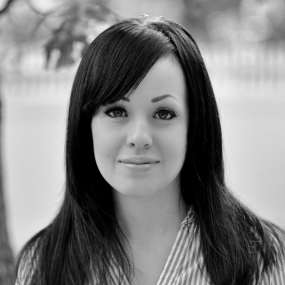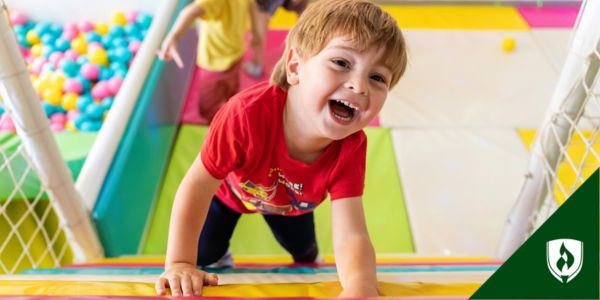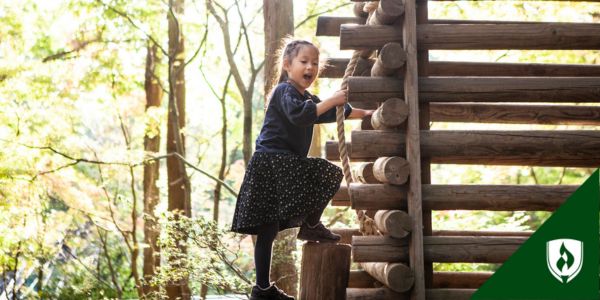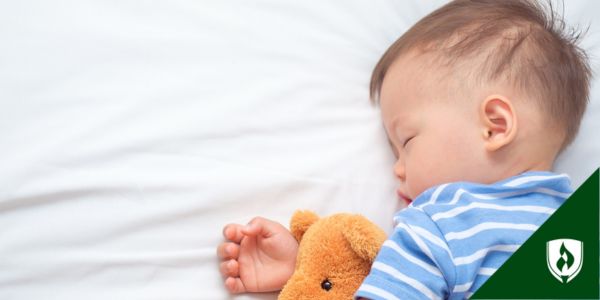
Early childhood education, AKA: working with young children. Some people think that means playing with toys, passing out snacks and sipping lattes during naptime. The truth? It’s a smidge more demanding than that.
Children in preschool and childcare programs are dealing with culture shock to some extent. They’re still getting used to the structure a school program adds to their day. On top of that, each child enters your classroom with unique learning goals. When you’re a lead teacher, it’s up to you to make sure your curriculum supports those needs.
Fortunately, you’re not flying blind.
Earning your early childhood education degree means you’ll finally crack the code on factors impacting child development. You’ll learn how to create and tailor children’s learning programs. Best of all, your education will prepare you to become a go-to resource for your students’ families.
Whether you are anticipating an associate’s degree in ECE or a full bachelor’s degree in early childhood education, the coursework you take should elevate your understanding of child development, the methods you can use to enhance their learning, and so much more.
So, maybe you already have field experience. Maybe you’re completely new to the program. Either way, these are six courses you can expect to take.
3 early childhood education courses to look forward to in your Associate’s program
Working with young children means recognizing—and supporting—their developmental needs. With these courses, you’ll learn how to develop and curate learning activities for each student you meet.
1. EEC2225 Guiding Children’s Behavior
Ever find yourself wondering why kids act the way they do? How come some children gladly follow directions, while others simply refuse? What causes toddlers’ infamous meltdowns? Does good behavior just happen by chance? Is there such a thing as a “bad kid?”
There are two kinds of people losing sleep over these questions: frustrated parents and early childhood education (ECE) students.
Usually, there’s a logical explanation for a kid’s actions. And, once we know the cause of bad behavior, we, as adults, can take steps to correct it. Guiding Children’s Behavior gives you the tools to do just that.
Course work shows students how educators and adults can promote self-regulation and incorporate positive behavior practices in their everyday work with children's social-emotional development.
Placing emphasis on cultural awareness, trauma sensitivity and behavioral science, this course delivers powerful information. It helps students hone their communication skills while learning how to encourage positive changes in children’s attitudes and actions.
“Rather than simply give student strategies for working with challenging behaviors, the course helps students to understand reasons behind behavior and how they can help children learn self-regulation and empathy,” says Dr. Mary Muhs, Associate Dean of Education at Rasmussen University.
“Students often say how eye-opening this course was for their work with children and how they wished they knew this sooner.”
2. EEC2401 Dynamics of the Family
Strict and stressed moms. Laid-back dads. Gender norms are part of society, but they don’t tell us much about real family dynamics. Every family is different, and expecting a family to look a certain way can be a barrier in ECE. “This course focuses on the ever-changing and diverse family structures and needs, and how families impact a child’s development,” says Muhs.
Getting to know a child means getting to know that child’s family. Family structures and learning abilities go hand-in-hand—especially when it comes to preschool-aged children. When you work in ECE, building family relationships is so crucial.
“Students can start the course being nervous and lacking confidence with families, but they will leave with a strong understanding of how to develop a positive relationship with the families they work with every day, no matter their role,” Muhs says.
Dynamic of the Family will focus on the family's influence on the growth and development of children, including discussion of family systems and parenting styles. The course will explore issues that families of today face and how educators can support their success through communication and engagement.
3. EEC2613 Observation and Assessment in Early Childhood Education
If you’ve worked with small children before—or if you’re a parent—you know every child learns at their own pace.
Some children know how to read in pre-K. Others may not complete their first book on their own until kindergarten or first grade.
There are countless reasons for this: personal interests, health and wellness, outside influence (parents, siblings, etc.), environment and surroundings, communication abilities, developmental needs—the list goes on.
“In this course, students will explore different tools and strategies for observing child development and how then to prepare the environment and curriculum to support each child’s growth and learning,” Muhs explains.
Classroom teachers have their work cut out for them. In a sea of diverse student needs, they’re the ones holding the compass. This is especially true with regard to teachers who work in special education. (For more on that, check out 9 Things You Need to Know Before Working with Special Needs Students.)
Ultimately, teaching strategies require thoughtful curriculum planning, observation and assessment of each child’s progress.
“With a big focus on developmentally-appropriate practices, students leave the course with a new perspective on the work they are required to do regularly in their programs,” Muhs says.
3 more early childhood education courses you’ll take when you pursue a Bachelor’s
The associate’s degree level courses are also part of the program for a bachelor’s degree in ECE, which builds on these foundations of early childhood. If you are part of the bachelor’s degree program, you can look forward to a bit of a deeper dive.
These ECE programs offers a comprehensive understanding of child growth and child development. Deepen your learning when you complete the following upper-division courses:
1. EEC3000 Early Childhood Education: Understanding Mental Health in the Early Years
“This is a powerful course for sure,” Muhs says.
A mental health crisis has children and teens throughout the U.S. in its grip, according to recent child studies, the American Psychological Association (APA) reports.1 Mental and physical wellbeing directly impact child development. Understanding this connection is crucial for education majors.
“This course is a hot topic and students find that they are immediately connected,” Muhs says. “The course focuses on attachment, social-emotional development with children and how our personal mental health influences child development.”
Knowing the signs of mental distress in children—and how you can offer support in the classroom—is a critical skillset. Especially in our current climate.
2. EEC4015 Early Childhood Education: Diversity and Social Justice
The best learning environment is the one that creates a sense of community and honors every person, child, teacher and family member.
Early childhood can be a confusing time. Young children are only beginning to figure out the world around them. They’re trying to make sense of who’s who, what’s what and where they belong. Educators need to handle perspectives and culture with great care.
“This course has a way of challenging a student’s thinking a bit, but in a way that helps them to see from other perspectives,” Muhs says.
“The content covers how our personal biases impact children’s development and learning,” Muhs explains. “Students learn about diversity, cultural competence and humility and anti-bias education, while still honoring their own personal beliefs.”
3. EEC4485 Early Childhood Education Advocacy, Research and Policy
No two generations are the same. Times change. Research uncovers new findings. Technology advances. And legislative policies continue evolving.
From classroom settings themselves to each subject’s curriculum, children’s education programs are constantly being improved. Policymakers and educators turn to the latest science to ensure education programs—and the standards they’re held to—are designed for optimum efficacy.
“As one of the last courses students take in the ECE Leadership Bachelor degree, this course prepares students to look beyond their work in their early childhood setting and into the wider profession,” Dr. Muhs says.
You can take a bird’s-eye view of how this process unfolds. In this course, you’ll learn how to advocate for causes focusing on children, families and the ECE workforce.
Have you ever wondered why a certain ECE policy exists? In this course, you'll explore trends in the early childhood education field. Students will examine current research and national, local and legislative policies, exploring advocacy strategies and setting goals for future engagement in the early childhood education profession.
“Students often find this course helpful to their leadership pursuits both in and out of their current program,” Muhs adds.
How does the early childhood education program stay current?
With course work and curriculum each being products of the times, you may be wondering: how do early childhood education classes stay up-to-date?
“We make significant updates to courses to ensure we are best incorporating the latest standards and the most recent research,” Muhs says, explaining that these regular modifications help to ensure students get the training employers value.
How does the early childhood program integrate child development research?
Young children and their parents turn to educators for guidance on the link between learning goals and developmental progress.
For this reason, both the Associate’s and Bachelor’s Early Childhood Education degree programs at Rasmussen incorporate specialization options dedicated to childhood development.
“Most recently, our Associate-degree Children with Special Needs specialization courses have been updated to include working more deeply children on the Autistic spectrum, trauma-informed care and neurodivergent thinking,” Muhs says.
What else will you study when you pursue an early childhood education degree?
The ECE program is designed to deliver a complete, career-relevant learning experience. Students combine general education courses with early childhood education classes for a truly immersive, career-relevant experience.
“We are especially proud of our courses in the ECE Leadership Bachelor’s degree, which focus on getting students out of their individual ECE setting and into the wider ECE field and profession,” Muhs says.
“This degree really encourages students to think into their future as ECE professionals.”
Do these courses sound fun?
If you like the sound of these early childhood education courses, you might get a lot out of a degree in ECE. Check out the Early Childhood Education Degree opportunities at Rasmussen University.
Or if you could use a few more data points to help you decide between our program and another, check out “10 Reasons to Pursue Your Early Childhood Education Degree Online at Rasmussen.” and "What I Wish I Knew Before Starting My First Early Childhood Job".
1 Abrams, Zara. Kids’ mental health is in crisis. Here’s what psychologists are doing to help. Published January 1, 2023. [Accessed October 2023] https://www.apa.org/monitor/2023/01/trends-improving-youth-mental-health
Graduates of Early Childhood Education programs at Rasmussen University are not eligible for licensure as a teacher in an elementary or secondary school. A Bachelor’s degree and a state teaching license are typically required to work as a teacher in a public school and some private school settings. States, municipalities, districts or individual schools may have more stringent licensing requirements. Students must determine the licensure requirements in the state and school in which they intend to work.
Childcare facilities and the states in which they are located establish qualifications for staff who work with children and often implement guidelines regarding age, education, experience and professional development. Students must determine the licensure requirements for the state and facilities in which they work.
This program has not been approved by any state professional licensing body, and this program is not intended to lead to any state-issued professional license. For further information on professional licensing requirements, please contact the appropriate board or agency in your state of residence.




